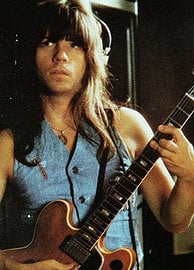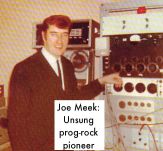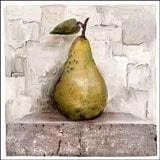/PAlogo_v2.gif) |
|
Post Reply 
|
Page 123 5> |
| Author | |||
Certif1ed 
Special Collaborator 

Honorary Collaborator Joined: April 08 2004 Location: England Status: Offline Points: 7559 |
 Topic: Prog vs Progressive - Is there such a thing? Topic: Prog vs Progressive - Is there such a thing?Posted: January 19 2010 at 07:54 |
||
|
Part I
It seems to me that many people, myself included, get confused over music that is Prog or Prog-Related, and music that is progressive.
Not surprising, since the former is implicitly the latter, isn't it?
Or is the latter the former?
What, exactly, do we mean by "progressive" anyway?
Ask two or more prog fans the same question, and I'm willing to bet you get different answers.
The most obvious answer is that there is some form of progression in the music - but this is usually related in one of three ways;
1. That the music itself contains progressions, the word here being used to mean passages of music that segue into another, standing in contrast to simple constructions such as a verse/chorus based song.
2. That the music on a particular recorded entity be somehow more sophisticated, or, failing that, merely different to music on a previous recorded entity by the same artist.
3. That the music by a particular artist be somehow more sophisticated than an artist held to not be progressive, or in some way equal to that of an artist that is held to be progressive.
Item 3 is obviously the weakest method of comparison, and leads to all kinds of vaguaries and misconceptions about what Progressive Rock really is, and item 2 ultimately shares the same doomed weakness.
Item 1 is not fantastic either, since many progressive compositions are indeed based around the old song structure, so focus here tends to shift to extended instrumentals, generally ignoring the fact that any band worth their salt enjoys a good jam session, and extended instrumentals can be very simple affairs, often comprising 3, 2 or even a single chord - so we're almost back where we started!
Let's backtrack a bit, to get a historical appreciation of Progressive Music.
Quite often I've seen mention of one of other of the great composers of centuries past, citing their progressive nature - and, in every sense we covered above, and others that we haven't considered yet, this is completely true.
For convenience sake, let's ignore them, because while they may have rocked, they most certainly did not produce rock music
In 1947, the Big Band arranger, Stan Kenton used the term to desribe his methods of arranging music - and this is the first recorded use of the term that I am aware of.
The "progressive" aspects were;
1) Kenton aimed to have a concert orchestra, rather than a standard big band, to perform the music - providing a kind of jazz/classical crossover.
This, of course, was nothing entirely new, since Debussy, Stravinsky and a large number of other "Classical" composers used jazz methods in their compositions, and Gershwin had already done the "Jazzman goes Classical" bit with "Rhapsody in Blue".
2) Layering. One of the things Kenton's progressive jazz was famous for was the layering of melodies, where one instrumental section would play a melody, then another would play a different melody over the top, adjusting for complimentary rhythms and so forth.
Students of counterpoint are probably tutting that this technique was already quite old by 1947 - but it was new(ish) to jazz, and especially to larger ensembles such as Kenton's, so we'll let that pass.
3) Harmonies. Of course, this layering led to dense harmonies, and dense harmonies were already a common aspect of jazz. Kenton could really push the envelope here, with such a musical force... of course, the Classical composers, such as Messaien and the Second Viennese School had worn out their T-Shirts long before.
4) Time Signatures. Kenton was fond of switching time sigs during a piece, and using sigs other than 2, 3 or 4. Maybe he was familiar with Stravinsky's "Rite of Spring" (1910) - who knows?
"Rite of Spring", of course, contains enough polyrhythms, strange time sigs and asymmetries to keep an extreme metal fan occupied for quite some time. Even The Butcher Shop Quartet could only manage a (very good) approximation!
5) Instrumental Timbres. The addition of orchestral instruments led to Kenton's music sounding very much like some of the more atonal compositions of the early 20th Century, and indeed, much of his later work was pronounced "undanceable".
Where does the progressive jazz end and the modern classical begin?
OK, so this is what Kenton meant by progressive - and it's really, really similar to many people's ideas of what makes Progressive Rock - unless you're talking about Prog after about 1975:
This coming together of the improvisational style of jazz and classical musics, and rendering of the rhythms, melodies and harmonies to the point where they become almost indistinguishable from a continuous and almost impenetrable noise seems very familiar to me when I hear Prog from that time, from ELP to King Crimson to Gentle Giant to Pink Floyd to Frank Zappa - it seems they were all pursuing a similar goal from completely different and personal directions.
It's even possible that this kind of push towards noise is what influenced George Martin to write THAT section for "A Day In The Life", and the similar (one might cruelly state identical) section on Pink Floyd's "Ummagumma".
It's also of note that the "noise" is harnessed - controlled in all cases. This can be seen as similar to total serialism, in which each minute parameter of music is scrupulously controlled by the composer, despite the end result ending up sounding like random noise.
For the more pedantic, of course, truly random noise, such as "white" noise is far removed from the vast majority of human compositions.... in the progressive jazz of Stan Kenton et al, we find that there are strong dissonances, melodies that tend towards the allusive and complexity in rhythm and timbre. The arrangements themselves also tend to lay flat any suggestion of musical form - but remain tightly controlled by the composer, while performances are encouraged to be wild, free interpretations of the score.
OK, we've followed that path for long enough.
It's plain to see how this applies to most "Classic" prog bands, but beyond that, it's not so clear.
The term "progressive" began to be somewhat overused by rock bands in the mid 1960s - if you were part of the progressive music scene, then, if your music sounded "right", then you could be considered a progressive musician - even if your abilities only stretched to the basic 3 rock chords, but if you learned a 4th, you were right in, as they say.
The Classic "Prog" bands (with exceptions) rose above this base, street/pub rock level, though, and progressive Rock became distinct from the Progressive Music (and Blues!) scenes with the release of "In The Court of the Crimson King".
Don't ask me why it was that album.
It's just one of those things. But there was an immediately apparent difference between King Crimson and, say, Led Zeppelin - but also plenty of "middle-ground" bands, such as Deep Purple and Spooky Tooth. Such is the spectrum of Progressive Rock - but such, also, are the differences between progressive rock acts and what you might call benchmark Prog groups - ones that live up to the ideals of the jazz men who first used the term.
Talking of benchmark Prog Groups, The Nice were actually responsible for releasing one of the few Progressive Rock albums that truly lives up to the initial goals - well before ITCOTCK was released. Robert Fripp was known to be a regular frequenter of The Marquee when The Nice were practically in residence, as were members of The Syn (later Yes) and numerous other Prog stalwarts.
"Ars Vita Longa Brevis" is simply breathtaking, even today, and truly makes you reconsider what Prog really is - if it matters to you, of course. And it's the second release by The Nice... and I'm not even a fan of Keith Emerson. Seriously, if you don't already own a copy, BUY IT and be blown away - or completely confused. Either way, it probably won't be what you expect to hear, and will be what you expect to hear at the same time.
In comparison, such proto-prog albums as "Days of Future Passed" pale into insignificance - a pop band backed by an orchestra, with some pretty songs - nothing more.
Comments?
Should I even bother with part II?
|
|||
|
The important thing is not to stop questioning.
|
|||
 |
|||
Snow Dog 
Special Collaborator 

Honorary Collaborator Joined: March 23 2005 Location: Caerdydd Status: Offline Points: 32995 |
 Posted: January 19 2010 at 08:07 Posted: January 19 2010 at 08:07 |
||
|
That's a lot to digest.
|
|||
 |
|||
Mr ProgFreak 
Forum Senior Member 

Joined: November 08 2008 Location: Sweden Status: Offline Points: 5195 |
 Posted: January 19 2010 at 08:19 Posted: January 19 2010 at 08:19 |
||
|
So, what is your conclusion? You started with "Prog vs. Progressive", but the bulk of your post is about what qualifies as "progressive".
Since I know that you have often said that Dream Theater aren't really "progressive" - have a look at this list: AC/DC - EDIT: Back in Black (instead of Hells Bells - my bad  ) ) Dream Theater - Awake Genesis - Foxtrot According to the criteria that you mentioned, where would you put the Dream Theater album in respect to the other two? Edited by Mr ProgFreak - January 20 2010 at 07:28 |
|||
 |
|||
patthemetaller 
Forum Newbie 
Joined: January 17 2010 Location: Ireland Status: Offline Points: 13 |
 Posted: January 19 2010 at 11:03 Posted: January 19 2010 at 11:03 |
||
|
Surely "Prog" and "Progressive" means much the same?
I mean my interpretation was always along the lines of prog/progressive meaning a band that didn't let boundaries dictate their music writing i.e. bands whos song structures veered away from the verse-chorus-verse-chorus-guitar sole-repeat chorus to fade out.....; and bands that incorporated any instrument into their music that enhanced the music. Here I'm coming from my experiences of the 1980's where thrashers ridiculed bands incorporating keyboards etc.
Edited by patthemetaller - January 19 2010 at 11:04 |
|||
|
\../
|
|||
 |
|||
earlyprog 
Collaborator 
Neo / PSIKE / Heavy Teams Joined: March 05 2006 Location: . Status: Offline Points: 2085 |
 Posted: January 19 2010 at 14:04 Posted: January 19 2010 at 14:04 |
||
|
Certif1ed, nice connections to Stan Kenton who is indeed "pre-proto-prog". His "Concerto to end all concerts" from 1946 is very progressive in my ears and surely must have influenced someone like Morricone and later Keith Emerson.
Could you provide examples of rock artists that are progressive but not prog? That would help clarify things for me.
|
|||
 |
|||
Icarium 
Forum Senior Member 

VIP Member Joined: March 21 2008 Location: Tigerstaden Status: Offline Points: 34050 |
 Posted: January 19 2010 at 14:33 Posted: January 19 2010 at 14:33 |
||
|
what about Quince Jonce i saw a Documentary about him once where they said hee was verry early Pioneer in the Fusion off Classical music and Jazz big/band. which made him one of the gratest producers of all time
|
|||
 |
|||
Certif1ed 
Special Collaborator 

Honorary Collaborator Joined: April 08 2004 Location: England Status: Offline Points: 7559 |
 Posted: January 20 2010 at 03:23 Posted: January 20 2010 at 03:23 |
||
There's clearly a difference - in fact, I would say there is a sliding scale of progressiveness.
The Kenton model is interesting, because it addressess all 5 fundamental elements of music, and is a close match to what can be found in "Classic" Prog. It also conveniently explains Can and Hawkwind alongside ELP and King Crimson.
I saw a documentary about Quicy recently - he had loads of good ideas.
Could you clarify your question? What about him?
Rather than produce a whole load of lists of "X" vs "Y", I think it's more helpful to get a handle on what "Progressive" means, in relation to music.
I have a feeling it means more than following the model of the first guy to use the term, but it's a good place to start, because the similarities in the model are so similar to the realities that it can't be just a co-incidence, can it?
|
|||
|
The important thing is not to stop questioning.
|
|||
 |
|||
Certif1ed 
Special Collaborator 

Honorary Collaborator Joined: April 08 2004 Location: England Status: Offline Points: 7559 |
 Posted: January 20 2010 at 03:24 Posted: January 20 2010 at 03:24 |
||
Quite obviously, I haven't reached a conclusion! Why should I - I'm not trying to tell people stuff, I'm asking a question and considering possibilites for an answer, or set of answers via a testable system. As you may notice from the subtitle, the first post in this blog is subtitled "Part I"...
I expect there will be many parts, if I'm encouraged to go on rambling!
Is there a problem with considering what is "progressive"? I made a blog quite a while back entitled "What Is Prog", which is easy to find in the "Blogs" section of this site, so surely some time should be devoted to "progressive".
We can redress the balance over the course of this blog - that is, after all, the point.
You're trying to draw me onto a completely different topic, and an old argument that you still seem to feel a bit sore about, but I guess it is useful to consider specific bands.
I'm quite a bit mystified as to why you would pit a Classic Prog album against one heavy metal song and a Progressive Metal album - could you explain your motive?
It is obvious that "Hells Bells" is a heavy metal song with a blues base and some interesting ways of using the blues (plus a novelty bell sound!), and Foxtrot ticks a huge number of boxes in the Kenton model - but interestingly, does not really approach the dissonance aspect.
I have never heard "Awake" by Dream Theater, and, from my experience with some of their other albums, I do not intend to subject myself to such an ordeal! Why should I continue to explore a band that I dislike?
Let me quote from the reviews on this site;
""Awake" is purely metal and clearly influenced by band members' all time favorite rockers" "On composition, all tracks have been beautifully crafted by the band, each track is well positioned to create ultimate satisfaction for listeners."
"Overall this album is produced well and is a delight for metal fans of the first two albums yet it continues the brilliant prog sound which follows on from the previous album."
"Erotomania is a dark and spellbounding instrumental that reminds me of "The Call of Ktulu" by Metallica."
"It is hard to say exactly what it is that falls short, but I believe it's mainly down to the guitar work. While it's fast and well performed, the solos seem to be to be rather directionless, and predictable."
" I was very impressed with the band's technical skills too."
"Dream Theater are ideal for those who want more than just plain Heavy Metal,a sort of Young Person's Guide to Prog Music.Not for me though. "
"Excellent work, but it's not a masterpiece in my opinion because it's a little repetitive sometimes (Voices, The Mirror, Lie and Scarred are too much similar songs...)"
It's telling that none of the reviews really dig in and describe the various aspects of music in terms of their complexities, but instead tend to simply mention that the reviewer thought them complex. I would rather doubt that it fits Kenton's model at all, any more than, say, Metallica or Iron Maiden (who Portnoy acknowledges were major influences on the band). Edited by Certif1ed - January 20 2010 at 03:26 |
|||
|
The important thing is not to stop questioning.
|
|||
 |
|||
earlyprog 
Collaborator 
Neo / PSIKE / Heavy Teams Joined: March 05 2006 Location: . Status: Offline Points: 2085 |
 Posted: January 20 2010 at 06:56 Posted: January 20 2010 at 06:56 |
||
|
"Progressive" is related to novelty and "inventive step" i.e. current (new) music needs to be assessed by the degree it deviates from prior music in order to establish it's degree of progressiveness.
A song is progressive if
Criterion #3 is where the music is progressed beyond it's base core, so to speak. It allows the musicians to add a little (or a lot) extra than required (goes beyond expectations). The first guitarist who did that was probably Steve Howe, a true progresive guitarist (as per criterion 3). The first keyboardist who did that was probably Keith Emerson. The first bass player was possibly Chris Squire. All filled every possible space in the music making it denser. Prog (yes prog) was initiated (as proto-prog) when individual players such as Howe and Emerson began to "saturate" the music in a rock context. "Emerson model" is one that defines prog as music that incorporates "the noodling" of the musicians, or something along those lines, I don't remember his exact words.
A song satisfying criterion #2 is "novel" but not necessarily "progressive" as per criterion #3. Edited by earlyprog - January 20 2010 at 06:58 |
|||
 |
|||
Certif1ed 
Special Collaborator 

Honorary Collaborator Joined: April 08 2004 Location: England Status: Offline Points: 7559 |
 Posted: January 20 2010 at 08:39 Posted: January 20 2010 at 08:39 |
||
Where is this definition rooted? Is it one of your own invention, or is there reference material available?
There are quite a few problems with it, beginning with the very first sentence.
"Progressive" may be related to novelty, but that it is a minor aspect, and novelty does not equal progressive!
For instance, Joe Dolce's "Shaddap Your Face" was a novelty, but hardly progressive.
On to the numbered list, only item 3 carries any substance, in my opinion.
1) If a song is in song format, then it only "progresses" as a song. All music "progresses" in time - that is the nature of music.
The sections of a song do not need to "deviate significantly" - in fact, there are many pop songs in which sections "deviate significantly", for example, any song which has quiet sections followed by loud sections. Nickelback's "How You Remind Me", and Nirvana's "Come As You Are" are good examples of this.
Genesis' "The Musical Box", for example, is packed with short sections which change, but do not significantly deviate from each other - in fact, each section appears to "grow" from the last. This kind of musical evolution could easily be held to be an example of progression in music.
2) Taking Genesis as the example again (there are other Prog Rock bands!), their overall style of song writing did not deviate significantly from album to album during the first 10 years or so (excluding the debut).
The songs share a lot of the same characteristics in terms of orchestration, long melody lines, the evolving musical idea I mentioned above, rhythmic motifs and formal exploration. This is not to say that the band did not progress, simply that deviance is not a signifier of progression.
The Deviants are a topical example of this.
The other main problem with this statement is that very few songs deviate "significantly" from any earlier recorded songs when you get to about 1969, which is when Prog was supposed to have "officially" started.
All I'm saying here is that the parameters need to be more confined - "deviates significantly" needs to be quantified.
3) In the Kenton model, it's pretty much the whole thing, rather than sections of the piece - but there also seems to be this overall goal within each piece to deconstruct the original ideas as much as possible and form a new overall sound.
I'm not sure about the "Emerson model" you cite - I assume you mean that wonderful quote of his about turning the music upside down and so forth, which is recorded somewhere in my "What is Prog?" blog.
Despite its vagueness, it is quite a good model for Prog Rock if only because it fits much "Classic" Prog. One of the biggest weaknesses in it is that it excludes just about all Modern Prog and Prog Metal (but, remarkably, includes unexpected acts like Metallica).
How does Steve Howe qualify as a "true progressive guitarist"? I would accept that statement of Robert Fripp, but I don't see how Howe fits the model (probably because I don't actually like Yes, so haven't paid him much attention!).
Emerson was first to get his kind of keyboard-driven Progressive Rock recorded, but there were a lot of "Progressive" keyboard players around at that time and before. He certainly fits the Kenton model best of all the keyboardists I can think of, but Billy Ritchie of Clouds had been doing similar things before The Nice were formed, and there were other innovative organists such as Graham Bond, Mick Weaver - and even Jimmy Smith.
Chris Squire was certainly an inventive bass player, but he did tend to hang on to repetitive riffs (from the little I've heard of Yes, which includes their first 3, Relayer, and Tales). Greg Lake's playing on "ITCOTCK" is certainly closer to either model than Squire's on either of Yes' first 2 albums.
I don't think that filling every possible space in the music to make it denser is really the ultimate goal of progressive music, or we'd only need write the equivalent of white noise to create it, and I think that the saturation achieved in Kenton's music, and some (but only some) of the "Classic" bands is only part of the story and definition.
This is why I think further exploration is needed - you've touched on some aspects of Prog/progressive, but not really made a distinction, and left out quite a large proportion of the body of music that makes up Prog Rock.
The model can only work if it's inclusive - the Kenton model and Emerson definition are both good places to start, but neither ultimately define Prog or differentiate it from progressive music. Progressive music itself, as you've rightly pointed out, must be defined several ways. As Robert Plant sang; "You know sometimes words have two meanings".
|
|||
|
The important thing is not to stop questioning.
|
|||
 |
|||
earlyprog 
Collaborator 
Neo / PSIKE / Heavy Teams Joined: March 05 2006 Location: . Status: Offline Points: 2085 |
 Posted: January 20 2010 at 10:14 Posted: January 20 2010 at 10:14 |
||
|
Prog is progressive rock (!) but not necessarily novel progressive rock. Often novel prog gets overlooked, at least to begin with, until finally accepted as prog perhaps even as a new genre of prog.
A static measure of "progressive" applies to most of today's prog while a dynamic measure of "progressive" that includes a high inventive step applies to very few and particularly late 60's prog.
You need to allow for new, novel prog which is boundary breaking. Prog is not static. In other words, the subgenres of prog are static whereas the definition of prog continues to evolve as new subgenres of prog will develop as prog with a high degree of novelty continues to develop.
BTW my previous post was just a discourse on "progressive" and not intended as a definition. I wish I could find a reference on Emerson's definition of prog. I once tried but didn't succeed.
If the prog genres on PA are included in your definition/understanding of prog then yes my definition (which I haven't stated) leaves out a large portion of what you think makes up Prog. (Don't get me started on psychedelic rock and Avant Prog
(Isn't Prog simply differentiated from progressive music as being the rock part of the latter? Is this simply the question you need to ask? I assume your thread is caused by the numerous claims that something is prog when in fact it's not according to you) Edited by earlyprog - January 20 2010 at 10:16 |
|||
 |
|||
ExittheLemming 
Forum Senior Member 

Joined: October 19 2007 Location: Penal Colony Status: Offline Points: 11415 |
 Posted: January 20 2010 at 10:51 Posted: January 20 2010 at 10:51 |
||
|
A laudable attempt to nail that slippery Progressive jellyfish to the ceiling sir. For what it's worth, I think criteria 1 is easily the most robust:
1. That the music itself contains progressions, the word here being used to mean passages of music that segue into another, standing in contrast to simple constructions such as a verse/chorus based song. However, to avoid those 'flat-packed epics' that are rife in pseudo prog i.e. short disparate sections of music that neither anticipate what follows or are seeded by what came before. i.e. an elongated medley of unrelated constituent parts. The best term I can come up with to describe musical materials that preface what is to come and continue to carry the 'DNA' of what came before is Evolve. I think segue a very apt proviso but very often such transitions are no more than 'linking glue' applied by skilful but unscrupulous arrangers. Whoops, I think I just unwittingly made a case for Brian Wilson to be admitted to PA ?  |
|||
 |
|||
Icarium 
Forum Senior Member 

VIP Member Joined: March 21 2008 Location: Tigerstaden Status: Offline Points: 34050 |
 Posted: January 20 2010 at 11:55 Posted: January 20 2010 at 11:55 |
||
I saw a documentary about Quicy recently - he had loads of good ideas.
Could you clarify your question? What about him?
 i hope this make sence i hope this make senceor was Quiny a product of Kenton  |
|||
 |
|||
Procol Harum Machine 
Forum Newbie 
Joined: January 19 2010 Status: Offline Points: 36 |
 Posted: January 20 2010 at 15:45 Posted: January 20 2010 at 15:45 |
||
|
I always thought prog was a separate genre till recently.

|
|||

|
|||
 |
|||
Certif1ed 
Special Collaborator 

Honorary Collaborator Joined: April 08 2004 Location: England Status: Offline Points: 7559 |
 Posted: January 21 2010 at 04:23 Posted: January 21 2010 at 04:23 |
||
Permission to steal the line "slippery Progressive jellyfish"?
Easily done. Watch where that jellyfish flies...
How to spot the difference between a miraculous evolving segue and mere glue?
One of the slipperyest and most bipolar truths is that "You just feel it".
This truth is the constant cause of argument because everybody feels music differently - but at the same time, it's generally acknowledged that there must be a line somewhere, as your Brian Wilson example illustrates.
I was asked in an earlier post to provide some kind of list.
Lists can be useful, but how do you go about compiling a definitive list of bands?
The answer I came up with to that question is simply "You can't".
It is tempting to try to list Prog vs progressive vs non-progressive artists - but as music is personal, everyone has their own way of doing things, so there can be no boundaries, only gradients.
On the other hand, some kind of definitive list would help by way of benchmark - all too frequently, comparisons are made in order to justify progressiveness, so let's have some authentic bands to use as comparisons - why not?
I looked at the 40 most popular artists on this site in the last 24 hours for a list to kick this off - but seeing that it currently contains Iron Maiden and Various Artists, and omits Hawkwind and Can, I'm not so certain that it's a definitive Prog list...
Other than that, it seems to be well represented, with all the usual suspects and a few surprises;
POPULAR ARTISTS (TOP 40, LAST 24H) : Which of these, if any, are progressive rather than "Prog"?
Finally (for now), I feel it would be good to have a list of the many distinct definitions of "Progressive" as it relates to music.
A quick cogitatation provides;
1) General evolution of musical ideas in a historical context, ie from one generation of musicians to another. These musical ideas may be broken down into a list of specific "elements" and compared against their use by previous generations.
2) Evolution of musical ideas within a piece - i.e. the musical ideas evolve within their own context. Best examined from a theoretical perspective, as it can be difficult to hear this at work from a casual listen.
3) An attitude or propensity of musicians to actively attempt to create new and different music (This is like the difference between Radiohead's "Kid A" and "OK Computer", where the entire musical style is radically changed). 4) "Novelty", or use of radical musical ideas within a piece, such as tangential changes, new or unusual instrumentation, unusual time signatures, etc.
5) A sound or style which is peculiarly progressive. This may be many, many things, can be very personal, and is not really useful, but nevertheless, is a means by which "progressiveness" is measured in "real life".
6) General acceptance of a band by a fan base or the media, of progressive status. Meh. If only this were not true! Any glaring omissions?
I'll come back to "Progressive" in a later post, because there are more historical examples that precede the 1960s - again, in Jazz - and also because I think that "Progressive" should be thrashed out a bit more until a level of granularity is achieved, along the lines of;
1. Not progressive. "Twinkle, Twinkle Little Star" is more progressive.
2. A bit progressive - more progressive than "Twinkle, Twinkle Little Star", that's for sure.
3. Contains identifiable progressive ideas (let's avoid "elements"!). "Twinkle, Twinkle Little Bat"?
4. Progressive. Easy Star All-Stars. Oh, hang on, they're a cover band...
5. Full-blown Prog Rock, no doubt about it. "Starship Trooper". More lists than you can shake a stick at
Oh, and this article entertained me greatly;
|
|||
|
The important thing is not to stop questioning.
|
|||
 |
|||
earlyprog 
Collaborator 
Neo / PSIKE / Heavy Teams Joined: March 05 2006 Location: . Status: Offline Points: 2085 |
 Posted: January 21 2010 at 09:00 Posted: January 21 2010 at 09:00 |
||
|
^Regarding your list of definitions of "progressive":
Now I see that your purpose is to establish a measure of progressiveness, right? Edited by earlyprog - January 21 2010 at 09:26 |
|||
 |
|||
About The Round 
Forum Newbie 
Joined: October 08 2009 Status: Offline Points: 2 |
 Posted: January 23 2010 at 20:03 Posted: January 23 2010 at 20:03 |
||
Being progressive is about attitude. And Progressive rock is rock music with an progressive attitude. Even Avant and Rio outfits do not have to be progressive in the strictest musically sense cause it's already done by Varese and other modern composers. But the addition of rock distinguishes Avant/Rio from Varese hence the term progressive relates to mainstream/traditional rock only.
|
|||
 |
|||
Dean 
Special Collaborator 

Retired Admin and Amateur Layabout Joined: May 13 2007 Location: Europe Status: Offline Points: 37575 |
 Posted: January 23 2010 at 21:50 Posted: January 23 2010 at 21:50 |
||
|
It is evident (to me) from the observation that not all Progressive Rock music can be described by one set of criteria (however simple or complex you care to make it), that accepted Prog bands exist that use some, all or none of the criteria and still somehow manage to be "Progressive", while others can use a proven subset of the criteria in a 'prog-by-numbers' approach and thus be Prog but not Progressive. This is not a failing of the criteria, or even a failure of our understanding of "what is Prog/Progressive", but a function of the nature of the beast.
If these changes (evolution) are not evident to the casual listener then they possibly were not that evident to the "composer" either, but where a natural (i.e. logical) development of the tune from a relatively simple melody, refrain or rhythm pattern over the course of the piece through some artistic performance process (additive/subtractive and expanding/contracting) rather than by planned compositional design process (following some rule or progression). Simply put, the next note is the one that sounds right, whether it fits the chosen key or not; the next beat is the one that feels right, whether it fits the chosen time signature or not and the next word is the one that is right, whether it scans or rhymes or not.
(Carrying on the Evolution analogy) those 'random' mutations (of note, beat, word, etc) feedback into the composition forcing a development (progression) of the underlying melody and rhythm, which leads to yet another mutation, more feedback and more progression - so, for example, a key change is forced by the mutation, not by some plan, or a time signature change is created by accident rather than design
Given that Progressive Rock didn't have a fixed centre of origin (even taking King Crimson into account - even they had peers and contemporaries, none of whom were clones or copyists) then it is unlikely that any set of criteria can be right for all bands, even from the time when the sum total of all the members of those bands could fit comfortably in the Marquee or the UFO club, so it is equally as unlikely that a set of criteria can be concluded that describes the generic idea of what Progressive means.
This is not to say that some Progressive artists didn't have a plan or modus operandi, for it is clear that once some bands found a magic formula they often repeated it, whereas others simply copied a perceived process without understanding of the mechanics behind it, and with that, the pioneers and experimentalists are as likely to have been from outside the genre as they are from within it.
...not from Prog, but an example of what I'm trying to say never-the-less:
Edited by Dean - January 24 2010 at 05:48 |
|||
|
What?
|
|||
 |
|||
Atavachron 
Special Collaborator 

Honorary Collaborator Joined: September 30 2006 Location: Pearland Status: Offline Points: 64320 |
 Posted: January 23 2010 at 22:03 Posted: January 23 2010 at 22:03 |
||
|
^ well if musical creation is anything like writing - which in many ways it is - I suspect your postulation is accurate to the extent that most literature is over-interpreted: more often than is widely thought the author did not intentionally include symbols, allegories or even morals in a story. That those patterns seem to exist is more a function of the nature and limitations of language, the brain, people, and how those things function and interact.
|
|||
 |
|||
earlyprog 
Collaborator 
Neo / PSIKE / Heavy Teams Joined: March 05 2006 Location: . Status: Offline Points: 2085 |
 Posted: January 24 2010 at 06:25 Posted: January 24 2010 at 06:25 |
||
|
As I see it, Dean and Atavachron are also establishing the same formula or relationship between input and output, the former being the constituents of the music, the latter being the feelings and thoughts the music generates in the listener. In other words, prog rock can be defined both by the constituents of the music and by the psychological effects observed by the listener.
Both sides of the equation "Psychological effect" = f(composition/variables of music) are equally valid as a definition of (the level of) prog, but the relationship between the two allows you to design or predict the outcome of the music.
The formulation would be less complex if focusing on a subgenre of prog as a description of the aggeregate or sum of prog subgenres is likely to fail as not all subgenres on PA are actually prog (IMO).
Anyway, back to the initial question: "Prog vs. progressive - Is there such as thing"? Well, what is meant by "vs."? Is it the relationship between prog and progressive(ness)?
|
|||
 |
|||
Post Reply 
|
Page 123 5> |
| Forum Jump | Forum Permissions  You cannot post new topics in this forum You cannot reply to topics in this forum You cannot delete your posts in this forum You cannot edit your posts in this forum You cannot create polls in this forum You cannot vote in polls in this forum |